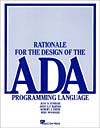
 Rationale for the Design of the Ada Programming Language
Rationale for the Design of the Ada Programming Language
by Ichbiah, Barnes, Firth, and Woodger
ISBN 0-9615336-5-X
1986
390 pages, Paperback
$39.95 (US Dollars)
Summary
Contents
Table of Contents:
- Introduction and Preface
- Goals
- Structure
- Acknowledgements
- Lexical and Textual Structure
- Lexical Structure
- Textual Structure
- Classical Programming
- Simple Declarations: Variables and Constants
- Declarative Parts - Linear Reading
- Multiple Declarations
- Names
- Aggregates
- Expressions
- Statements
- Assignment Statements - The Ada Model of Time
- If Statements
- Short-Circuit Control Forms
- Case Statements
- Loop Statements
- Types
- Introduction
- The Concept of Type
- Type Equivalence
- Constraints and Subtypes
- Array Types
- Record Types
- Discriminants
- Mutability
- Numeric Types
- Introduction
- The Integer Types
- The Real Types
- Implementation Considerations
- Conclusion
- Access Types
- Introduction
- Overview of the Issues
- Presentation of Access Types
- Derived Types
- Informal Introduction to Derived Types
- Simple Strong Typing
- The Explanation of Numeric Types
- Simple Strong Typing
- The Explanation of Numeric Types
- The Ability to Inherit Literals
- Achieving Transitivity of Visibility
- Change of Representation
- Conclusion - Achieving Copies in Ada
- Subprograms
- Subprogram Declarations and Subprogram Bodies
- Parameter Modes
- Parameter Passing Notations
- Function Subprograms
- Packages
- Motivation
- Informal Introduction to Packages
- Technical Issues
- Summary and Conclusion
- Separate Compilation and Libraries
- Introduction
- Presentation of the Separate Compilation Facility
- Methodological Impact of Separate Compilation
- The Program Library
- The Implementation of Separate Compilation
- Summary and Conclusions
- Visibility and Overloading
- Introduction
- Program Structure
- Visibility Rules
- Overloading
- Overload Resolution
- Generic Units
- Introduction
- Informal Presentation of Generic Units
- The Use of Generic Units
- Rationale for the formation of Generic Units
- Tasking
- Introduction
- Presentation of the Tasking Facility
- Rationale for the Design of the Rendezvous Facilities
- Packages and Tasks
- Exception Handling
- Introduction
- Presentation of Exception Handling in Ada
- Examples
- Tasks and Exceptions
- Technical Issues
- Representation Clauses and Machine Dependencies
- The Separation Principle
- Types and Data Representation
- Multiple Representations and Change of Representation Representations
- Presentation of the Data Representation Facility
- Enumeration Types with Noncontiguous Representations
- Configuration Specifications and Environment Enquiries
- Interface with Other Languages
- Unchecked Conversions
- Input-Output
- Introduction
- Basic Requirements
- Designation of Files
- Indexed and Sequential Files
- Text Files
- Exceptions and Renaming
- Low-Level Input
- Conclusion
- Bibliography
- Index
|
